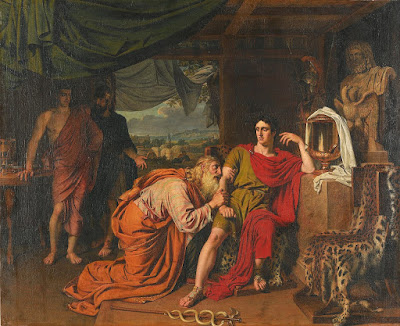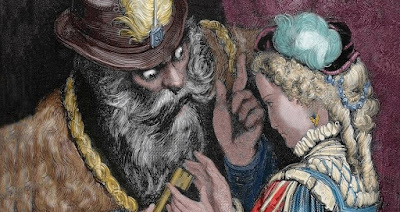Reading Notes: The Iliad, Part B
There are few emotions more powerful and despairing to a human than loss. To lose a loved one can move someone to absolute melancholy, and to lose the one closest to you in the world can be the end of what you know. This idea is one of the central pieces of the Iliad - Achilles' loss of his beloved Patroclus makes for a turning point in the war, leading directly to the deaths of several champions on either side, a great war for the retrieval of the body, and leads directly to the death of the Trojan's mightiest warrior, Hector. Thanks to Agamemnon's scorning of Achilles, the beloved men of people on either side of the war fall too soon, and the possible materialization of the prophecy that Achilles shall fall within the hour of Hector bears down upon the Greek morale. The legendary slaying of Patroclus and the utter disregard for honor or mercy Achilles shows creates a perfect example for a tale of personal vengeance, displaying one of the lowest parts of the human condition. Following the death, the morning of Achilles for Patroclus further expresses his loss, and the bargaining for the body shows how beloved Hector was to the Trojans. Even Achilles is moved to pity by Priam, and surrenders the body he so blatantly mistreated.
Family is yet another topic I want to strike in my writings - not necessarily in the traditional sense. Family does not always work out normally, nor does it always form by blood, nor does it always bring comfort. Here, the kin of Hector are so severally taken with grief by his death, displaying further the theme of loss.
Overall, the Iliad is a powerful work, which has given it a longevity unlike almost any other work in Western civilization. The motifs it deals in aren't just legendary in construction, but work in the human condition at its best and worst.
Bibliography: The Iliad in Shortened Prose, the Untextbook. Web link
 |
| Priam Bargains with Achilles |
Family is yet another topic I want to strike in my writings - not necessarily in the traditional sense. Family does not always work out normally, nor does it always form by blood, nor does it always bring comfort. Here, the kin of Hector are so severally taken with grief by his death, displaying further the theme of loss.
Overall, the Iliad is a powerful work, which has given it a longevity unlike almost any other work in Western civilization. The motifs it deals in aren't just legendary in construction, but work in the human condition at its best and worst.
Bibliography: The Iliad in Shortened Prose, the Untextbook. Web link



Comments
Post a Comment